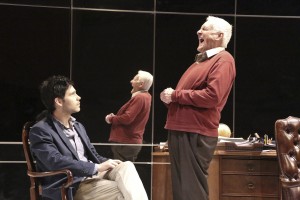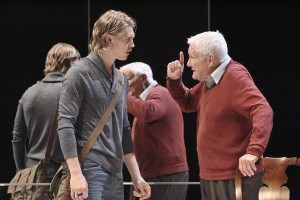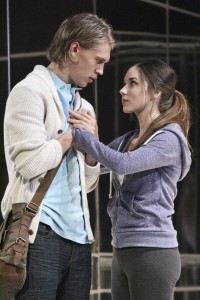DEARTH OF DRAMA
Steven Drukman’s Death of the Author takes its name, premise, and some of the devices in its dialogue from a Roland Barthes essay on postmodernism. It’s wonderful to see Drukman adapt Gore Vidal’s riposte to William Buckley about crypto-Nazis and fold it into a pun on Marxist literary theory. But there’s nothing  postmodern about this play’s construction; it’s a straight-ahead drama that owes much to Mamet’s Oleanna, Hellman’s The Children’s Hour, all the classic academic-setting idea plays. But like the excellent dialogist Teresa Rebeck, Drukman can sometimes spend himself on wizardly lines, having little breath left to create character, stakes, suspense, urgency – the attraction for which we listen to stories. In Bart DeLorenzo’s production at the Geffen, this play crawls toward its thematically incoherent ends on Takeshi Kata’s equally incoherent set – a mirrored shadow box that allows viewers to watch each other whenever this one-act world premiere lags.
postmodern about this play’s construction; it’s a straight-ahead drama that owes much to Mamet’s Oleanna, Hellman’s The Children’s Hour, all the classic academic-setting idea plays. But like the excellent dialogist Teresa Rebeck, Drukman can sometimes spend himself on wizardly lines, having little breath left to create character, stakes, suspense, urgency – the attraction for which we listen to stories. In Bart DeLorenzo’s production at the Geffen, this play crawls toward its thematically incoherent ends on Takeshi Kata’s equally incoherent set – a mirrored shadow box that allows viewers to watch each other whenever this one-act world premiere lags.
Nobody in this story of academic integrity is very surprising:
- the entitled left-brain rich kid accused of plagiarism, in a series of great sweaters;
- the beautiful, ingenious, dramatically extraneous girlfriend in yoga pants;
- the insecure, overworked, young English professor with a passive-aggressive chip on his shoulder;
- and the bestselling curmudgeon and English department chair, who loses his glasses by putting them on top of his head.
 These are stock characters imbued with varying levels of enthusiasm. Orson Bean as the literary bear makes the play fifty percent better every time he walks onstage; his is a fine, sharp presence, benefiting also from the best writing in the play. The other actors all are adequate, but none of their performances is motivated to a degree sufficient to put onstage. They tend to look as if they’re discussing an important Christmas gift for a discriminating relative, not the weighty matters one might expect in a drama, such as destroyed careers or suicide or infidelity or loss of faith. Or a mortgage. Or an overflowing toilet. Which makes sense, because none of these characters has much to lose:
These are stock characters imbued with varying levels of enthusiasm. Orson Bean as the literary bear makes the play fifty percent better every time he walks onstage; his is a fine, sharp presence, benefiting also from the best writing in the play. The other actors all are adequate, but none of their performances is motivated to a degree sufficient to put onstage. They tend to look as if they’re discussing an important Christmas gift for a discriminating relative, not the weighty matters one might expect in a drama, such as destroyed careers or suicide or infidelity or loss of faith. Or a mortgage. Or an overflowing toilet. Which makes sense, because none of these characters has much to lose:
- The student has summer school hanging over his head. As if to underline the triviality of this jeopardy, the flag on his academic transcript is not red, it’s yellow.
- The girlfriend might have to break up with her boyfriend again, OMG. They’ve been together for all of three years.
- The young professor might get tenure! He might get fired! But there’s always that fallback job in Kentucky.
- The curmudgeonly author wants to retire anyway.
 So nothing really matters. A number of interesting tangents on sexual, academic, and bureaucratic politics are peppered with bons mot and mots justes. But the only dynamic character, shaping up to be either an idiot savant or a real scumbag, turns out to be a completely uninteresting decent person, and near the end a character peripheral to the action tosses off a revelation with greater dramatic potential than anything actually under discussion. The central conflict is resolved over a joint. They talk pretty, some of the time, but I wanted to leave the room whenever Orson Bean did, which was too often.
So nothing really matters. A number of interesting tangents on sexual, academic, and bureaucratic politics are peppered with bons mot and mots justes. But the only dynamic character, shaping up to be either an idiot savant or a real scumbag, turns out to be a completely uninteresting decent person, and near the end a character peripheral to the action tosses off a revelation with greater dramatic potential than anything actually under discussion. The central conflict is resolved over a joint. They talk pretty, some of the time, but I wanted to leave the room whenever Orson Bean did, which was too often.
Death of the Author
Audrey Skirball Kenis Theater
at the Geffen Playhouse
10866 Le Conte Avenue in Westwood
Tues-Fri at 8; Sat at 3 & 8; Sun at 2 & 7
scheduled to end on June 29, 2014
for tickets, call 310.208.5454
or visit www.geffenplayhouse.com

